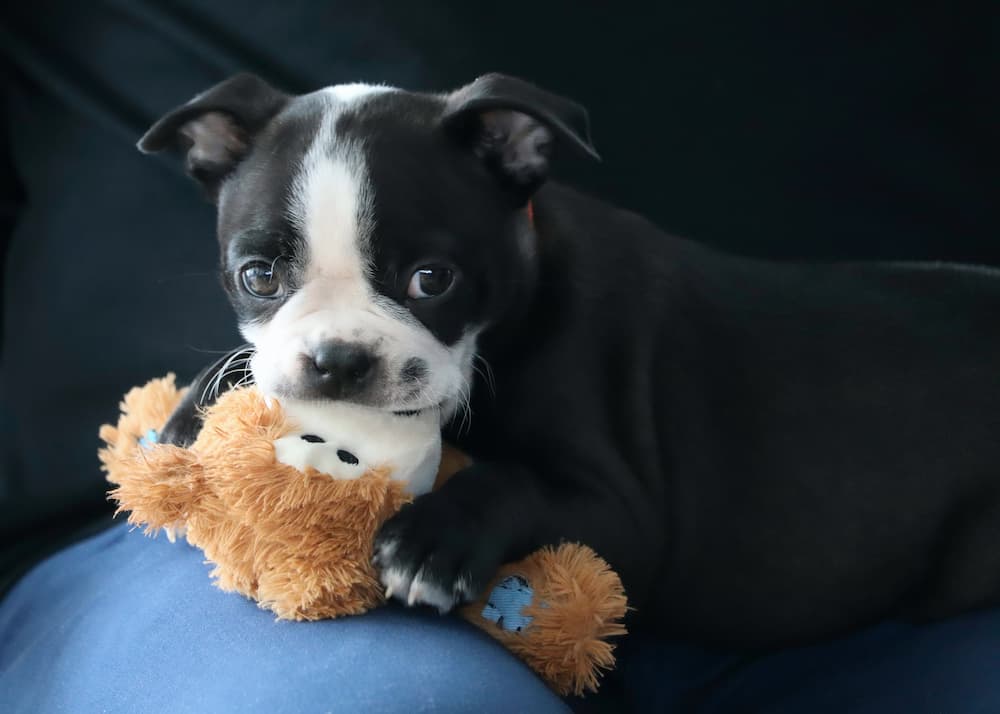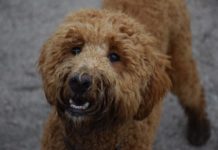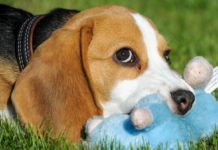Quicklinks:
- Reasons Why Your Puppy Is Biting Your Face And Hair
- Why It’s Normal Behavior
- Giving Your Puppy Enrichment
- Stopping Your Puppy From Biting
- Why You Shouldn’t Punish Your Puppy
- Toys For Teething
Reasons Why Your Puppy Is Biting Your Face And Hair
Although it’s frustrating and sore when your puppy tries to bite your face and hair, it’s important to know that this behavior is completely normal for puppies! Young pups will bite for many reasons, including exploring, teething, and playing. The good news is that puppies will grow out of their excessive biting phase. In the meantime, with a combination of management, enrichment, and training, it’s possible to save your skin and hair from all the nipping!
Why It’s Normal Behavior
When your puppy was with their litter siblings, they were all be biting at each other constantly! Puppies have super sharp teeth, which are used in order to receive immediate feedback from their brothers and sisters. If they bite another puppy too hard, that puppy would yelp and the play would stop. This teaches puppies to bite (mouth) softer if they want to continue playing with the rest of the litter. As puppies grow, they get better at bite inhibition or controlling the pressure of their bite, so that they won’t cause pain or damage when they’re playing.
As we aren’t dogs, we cannot yelp, growl, or otherwise communicate as dogs would. So, what should we do?
Giving Your Puppy Enrichment
Since we know biting is natural puppy behavior, it’s very important to provide appropriate outlets! You need to keep your puppy’s mouth busy on puzzle toys like Kongs. If your puppy is teething, freezing these toys can feel great on their sore gums.
Biting often goes hand in hand with chasing and tugging. If your puppy is biting and playing tug-of-war with your hair, consider a flirt pole toy. The flirt pole toy is a great way to redirect chasing and biting onto something more appropriate and is very effective at giving your puppy plenty of exercise.
Lastly, consider making safe-socialization opportunities for your puppy. Playtime with other puppies is a great way for your puppy to receive proper feedback when they bite.
Stopping Your Puppy From Biting
For now, avoid using your hands or arms during playtime! Everyone in your household needs to be on board with this rule. Many of the ways humans play with their puppies are actually teaching and encouraging them to bite. Wrestling with your puppy, especially with your hands, may confuse your puppy about where or when it’s okay to bite. It’s best to avoid these games with your puppy, especially during this stage of development, when they’re still learning bite inhibition. Anytime you want to play with your puppy, be sure to have a toy in your hand!
To lessen your puppy’s frustration, you can teach them recall, leash walking, and relaxation skills. Puppies often get “nippier” when they’re frustrated or tired.
Why You Shouldn’t Punish Your Puppy
Punishing your puppy, either physically or verbally, won’t stop your puppy from mouthing you in the future. Using punishment can actually increase frustration and fear, which could manifest into growling, barking, biting harder, or even more aggressive behavior. The use of punishment will ultimately destroy the bond that you’re trying to create with your puppy. Stick to using positive reinforcement training, enrichment, and management!
Toys For Teething
Puppies will bite at (mouth) things around them as a way to learn about their environment. It doesn’t seem to matter that they’re biting at your face or hair. Plus, young pups go through a teething phase where their gums are sore, which makes mouthing worse.
Providing your puppy with suitable toys to chew on is important for keeping their mouth busy. You can buy useful puzzle toys that you can fill with treats. With toys to chew on, your puppy will be less likely to show interest in your hands and hair. You’ll also want to carry these toys around, so you can have them ready for playtime when your pup gets restless.
When your puppy mouths your hand, face or hair during playtime, say “Ouch,” stop play, and ignore your puppy for 30 seconds, with longer breaks for each successive bite. These timeout periods reinforce the notion that playtime will stop when your puppy bites you. This is how puppies learn when playing with their siblings—the sound will let them know that they’ve gone too far.
Conclusion
If your puppy continually tries to bite your hair or face during playtime, and you’ve already used the “Ouch” reaction, then that’s where timeouts can be helpful. After your pup bites you more than three times in 15 minutes, put them in a timeout.
Mouthing can seem a lot like biting for new puppy owners, except it’s not meant to hurt. Rather, mouthing is more of a grabbing and chewing behavior, as when a puppy grabs your fingers or hair using their mouth—not so much using their teeth. Although mouthing starts as a game, it can sometimes develop into more destructive behavior as they get older, so it’s important that you stop it when they’re young.








